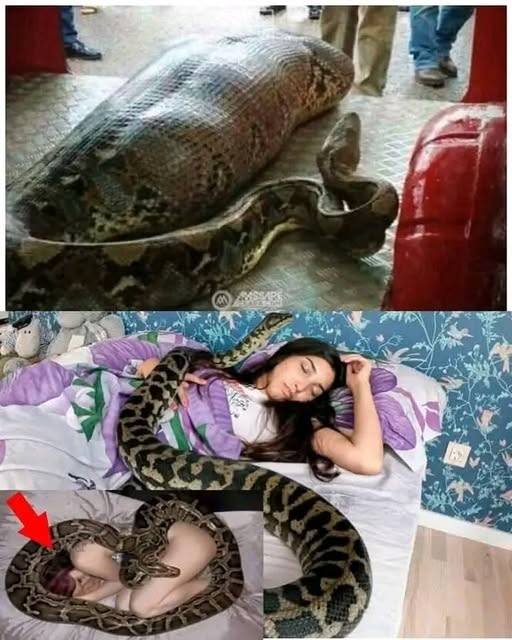For months, Cassandra believed she shared an unbreakable bond with her pet python, Reggie. When nights in her small apartment felt unbearably quiet, she would open his enclosure and let him slither onto her bed. The cool pressure of his muscular body pressed against her skin felt to her like comfort, even affection — a kind of closeness she thought only he could give.
But what Cassandra mistook for loyalty and love was, in truth, something much more sinister. A routine trip to the veterinarian would expose a terrifying reality that left her shaken to her core.
She had purchased Reggie when he was just a young snake, harmless in size and demeanor. At first, he lived under the glow of a heat lamp in his vivarium, feeding contently on pre-killed rabbits and chunks of chicken. Cassandra cared for him diligently, priding herself on being a responsible pet owner.
Over time, however, loneliness began creeping deeper into her life. Friends became busy with relationships and families, while Cassandra was left in solitude. Slowly, she turned to Reggie for companionship. What began as a harmless experiment — allowing him to stretch out on her bed one night — became a ritual she depended on. Before long, she couldn’t fall asleep without him coiled at her side, his movements syncing with her own breathing.
To Cassandra, this was trust. To her, it was proof of connection.
But troubling signs began to appear. Reggie stopped eating. No matter what she offered, he refused his meals — rabbits, chicken, nothing tempted him. Weeks went by. Stranger still, he began stretching himself out fully beside her, his long body stiff and still, as though measuring. Sometimes he resisted returning to his enclosure, restless and agitated.
Worried, Cassandra finally scheduled an appointment with Dr. Hanson, a vet known for his expertise with exotic pets. Carrying Reggie wrapped in a blanket, she expected an easy explanation — maybe stress, or a minor illness.
Instead, she received a revelation that left her nearly breathless.
Dr. Hanson, after examining Reggie, suggested an ultrasound. “Snakes sometimes refuse food if there’s a blockage,” he explained. Cassandra felt relief at the thought of finding answers. But when the image appeared on the monitor, the vet’s expression hardened.
“His stomach is completely empty,” Dr. Hanson said gravely. “Not from illness — he’s preparing.”
“Preparing for what?” Cassandra asked, her voice cracking.
The vet studied her carefully before replying. “Does he often lie stretched out beside you, almost like he’s comparing his length to yours?”
Startled, Cassandra admitted, “Yes… every night.”
Dr. Hanson exhaled. “Cassandra, your python isn’t cuddling you. He’s sizing you up as prey. His refusal to eat smaller meals is because he’s saving space — for something larger.”
The words hit her like a physical blow. For weeks, she had been sleeping beside a predator not out of love, but because he was gauging whether he could devour her.
“No,” she whispered, shaking her head. “He wouldn’t hurt me… he’s my pet.”
“Snakes don’t recognize love the way we do,” the vet said firmly. “They follow instinct. And his instinct tells him you could be his next meal. This is not affection — it’s survival.”
Her hands trembled as she looked down at Reggie, lying calmly, unblinking, as though nothing had changed. But everything had.
Within days, Cassandra made the heartbreaking choice to surrender Reggie to an exotic animal rescue. Watching handlers carry him away was like losing a piece of herself. He never looked back — and she couldn’t help but wonder if he ever truly saw her as anything more than food.
In the end, the ultrasound hadn’t just saved her pet — it had saved her life.
Now, Cassandra shares her story as a cautionary tale. “Don’t confuse instincts with affection,” she warns. “I thought I had a bond. What I really had was a predator waiting patiently.”
